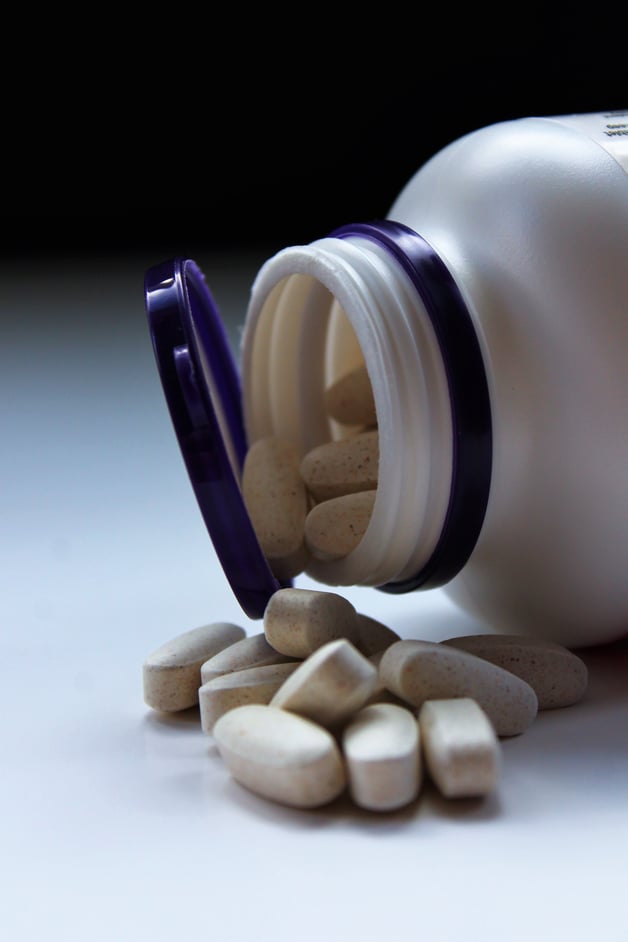In this article we will address the question; Can you take too much folate? To do this we need to define and understand different types of folate. We will also need to understand some of the side effects or adverse reactions that can occur from folate.
Are You Taking Too Much Folate?
Maybe you read the RDA on folate and you are worried you are consuming too much based on this. So what is the RDA and the RDA for folate? The RDA is the Recommended Daily Allowance and it is calculated for various vitamins. The RDA recommendations are based on the minimum amount needed to prevent any health complications from a lack of a vitamin. This is where the percentages on vitamin labels come from. You might see 1000% vitamin b12 in a vitamin or supplement. Remember this is based not he minimum amount needed to cause problems. That is not to say you can't take too much of any vitamin but for most it is a lot more than the RDA.
The RDA for folate it is 400mcg. Going above the RDA does not mean you are going to have a problem but this is minimum amount needed to prevent folate deficiency. However some people may need a lot more than this and need specific types of folate which we will discuss in more detail below. 
Many foods do have some folate fortified in them. So if you are consuming a "Standard American or Western Diet" you probably meet the RDA for your folate. However some people do not eat this way if you are doing a ketogenic or low carb diet perhaps you re not getting as much. Most of the fortification is in grains like flour, corn, rice etc. If you are avoiding grains you can also get a lot from dark leafy greens like salad greens.
Types of Folates
I have been using folate as a broader category to include folic acid, Methylfolate (5 mthfr, L Methylfolate) and folinic acid. These are all different types of folate. Folic acid is synthetic form man made folate and it is the most inactive form. Because it is less active, it has the least potential for side effects. That is not to say that side effects are not possible but just less likely.
Folinic acid is a more active form of folate. Typically it is used to support production of DNA base pairs. Folinic acid can also be turned into methylfolate. Methylfolate itself is the most active form of folate and can be recycled into folinic acid. It is also used at the center of the methylation or methionine cycle which is why there is more potential for side effects. You can read more about how folate work in your body here.
What Methylfolate Does for Your Body
Side Effects of Folate
Certainly side effects can occur from folate. They include headaches, anxiety, irritability, difficulty sleeping, hyper and revel up feeling, shortness of breath, heart palpitations, etc. All of these symptoms are stimulated feeling but sometimes you can also get fatigued, heaviness in the body, depressed mood. These are all signs you are getting too much folate. Some people will also get digestive issue like nausea. There is another article that goes into more detail on the methylfolate side effects (see below).
Side Effects of Mehtylfolate
The other thing to consider is masking a vitamin B12 deficiency. This can occur if you are taking larger amounts of folate and not also taking B12. These two vitamins work together to carry out their functions. Specifically they are cofactors for an enzyme in the methylation cycle called methionine synthase (see link above for more on this). If you only supply one of the cofactors you will potentially run out of the other.
Often times if you are looking up possible problems from folate or folic acid this (masking b12) comes up. Basically they are saying you either need to take B12 with your folate or don't take excess amounts. I have yet to see neuropathy or major problems from someone taking large amounts of folate without B12. Still this is a theoretic concern and makes physiological sense as well.
The same thing is true for taking other B vitamins and other nutrients that are cofactors for methylation or other pathways that are connected to methylation. The main thing is that when you increase cofactors (lie methylfolate) in your body, your body uses those to make more of other molecules. These new molecules then need additional cofactors as well.
So if you re taking larger amounts of folate you need to be considerate of other B vitamins and cofactors connected (or downstream ) to the main process you are tying to improve. Higher amounts of folate are around 2-3 micrograms or 2000-3000 mcg. The more you consume the more likely these other things need to be taken into consideration. It also depends how long you will be consuming the higher amount. If it is long term, give more thought to this as your risk for depleting these other cofactors goes up.
So that's it for the question, can you take too much folate. If you have follow up questions about this post in the comment section below. Those with MTHFR or other conditions may need a more customized plan for their folate intake. If you want a more customized plan click on the link below to get started.

 "My weight was getting so out of control. I started their weigh loss diet program and lost 32 lbs! I have been able to reduce my blood pressure medicine, fit back in my clothes, have tons more energy... Now I am back to eating and my desire for foods has changes drastically. Saved my life!!!
"My weight was getting so out of control. I started their weigh loss diet program and lost 32 lbs! I have been able to reduce my blood pressure medicine, fit back in my clothes, have tons more energy... Now I am back to eating and my desire for foods has changes drastically. Saved my life!!!
 "Dr. Cline and Dr. Terranella have been amazing! For the first time we found doctors that actually listen. They care about how your feeling and try everything they can to get you back to a normal state. I am in love with these guys! If you want amazing care, see these guys."
"Dr. Cline and Dr. Terranella have been amazing! For the first time we found doctors that actually listen. They care about how your feeling and try everything they can to get you back to a normal state. I am in love with these guys! If you want amazing care, see these guys."

















